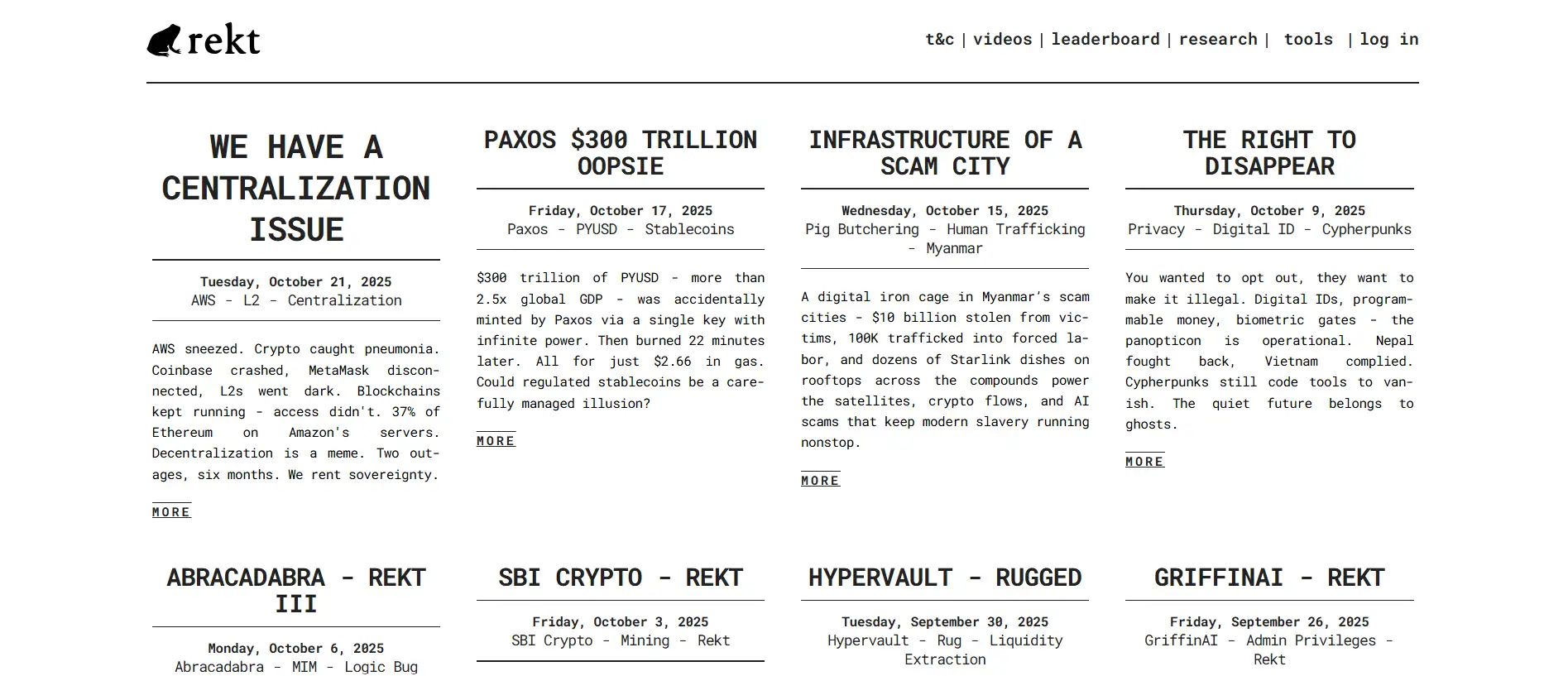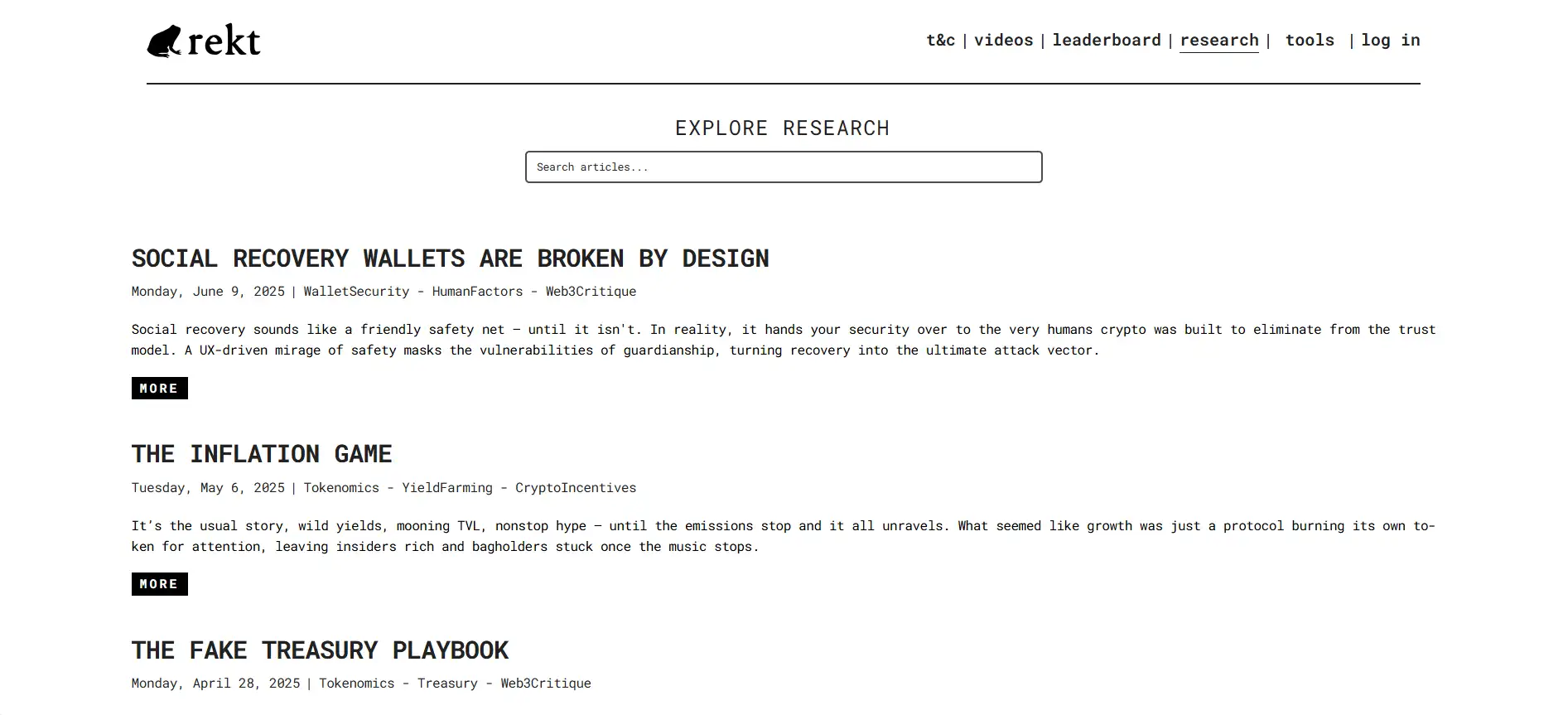About Rekt
Rekt is a powerful independent platform dedicated to exposing security failures, scams, and catastrophic breakdowns in the DeFi and Web3 space. Known for its investigative tone and technical breakdowns, Rekt delivers detailed postmortems on major protocol failures, uncovering vulnerabilities in smart contracts, admin key misuses, and broader systemic issues. The platform provides unfiltered reporting that holds malicious actors, irresponsible developers, and negligent projects accountable.
What sets Rekt apart is its editorial independence and data-driven reporting. Unlike promotional crypto outlets, it doesn't shy away from calling out projects—no matter how large or well-funded—for flaws that put users at risk. Whether it's a $300 trillion minting error or a multi-chain exploit with cross-border implications, Rekt documents it with precision, often using on-chain data and verified sources. Its work has become an essential resource for developers, auditors, and risk-conscious investors.
Rekt began as a response to a growing problem in decentralized finance—critical failures, rug pulls, and systemic vulnerabilities that were not being thoroughly documented. Created by Julien Bouteloup and now operated by the anonymous collective known as RektHQ, the platform gained immediate traction due to its deep technical analysis and bold, no-nonsense tone. It is not a news site or a security firm—it's a decentralized watchdog designed to make DeFi better by documenting its worst moments.
Each report published by Rekt includes comprehensive details: the name of the affected protocol, the loss amount, how the exploit occurred, and links to on-chain activity. These reports often highlight overlooked audit warnings, unverified code, privileged access abuse, or flawed oracle logic. Events such as the Abracadabra MIM logic bug, GriffinAI’s minting exploit, and the Paxos accidental $300 trillion mint are just a few examples.
Beyond incident-specific content, Rekt also publishes research articles exploring deeper flaws in the blockchain ecosystem. The Research section tackles issues like centralization of infrastructure, the illusion of decentralized governance, and systemic failures in smart contract design. One of its most impactful reports, “We Have a Centralization Issue,” details how over 37% of Ethereum nodes rely on AWS—making decentralization fragile and easily disrupted.
The Leaderboard is another unique feature. It ranks DeFi exploits by total losses, allowing users to see the scope of damage across the ecosystem. This isn’t just data—it’s an archive that reveals patterns: repeated audit failures, poor token design, and reused vulnerabilities. It gives users a clear sense of where risks lie and which projects to approach with caution.
Compared to platforms like Chainalysis, which offers analytics to institutions, or Rektify for exploit aggregation, for community-level scam warnings, Rekt distinguishes itself through editorial depth, real-time insights, and a focus on education. It doesn't just track events—it tells the full story of how DeFi fails and why.
Thanks to its fierce commitment to transparency, technical clarity, and cultural critique, Rekt has become a permanent fixture in the ecosystem. Its reports are quoted by developers, cited in research papers, and used by everyday users to avoid becoming the next victim. Rekt does not build products—it builds awareness.
Rekt provides numerous benefits and features that make it a standout project in the DeFi security landscape:
- Detailed Exploit Reports: Every report includes a narrative timeline, technical flaw explanation, and on-chain evidence with links to transactions and wallet addresses.
- Exploit Leaderboard: The Leaderboard ranks exploits by total USD losses, serving as a historic risk database for the industry.
- Independent Journalism: Rekt operates without ads, sponsorships, or affiliations, allowing for completely unbiased content.
- Educational Research: Long-form essays explore deeper vulnerabilities in tokenomics, UX design, infrastructure dependencies, and governance.
- Community Intelligence: Users and researchers can submit tips about suspicious activity, helping keep the platform responsive and real-time.
- No Barriers to Entry: Content is freely accessible, with no accounts, no wallets, and no paywalls required to access critical information.
Rekt is built as an open-access intelligence platform, designed for immediate use without registration or logins. Anyone interested in blockchain security, audits, or incident tracking can start using the platform right away.
- Step 1: Visit the official site: rekt.news.
- Step 2: Browse the homepage for the latest DeFi exploit reports and editorial content.
- Step 3: Navigate to the Leaderboard to see a ranked list of major exploits based on loss amounts.
- Step 4: Check the Research section for in-depth essays and industry critiques.
- Step 5: Click on any article to view full incident details, including cause of exploit, chain data, hacker addresses, and any responses from the affected protocol.
- Step 6: Follow Rekt on Twitter to receive real-time alerts about new hacks or project issues.
- Step 7: Contribute by reporting suspicious activity, sending tips, or supporting through donations at the ETH address listed on their site.
Rekt FAQ
Rekt prioritizes investigations based on the impact, uniqueness, and systemic relevance of a failure. The editorial team focuses on cases that expose deeper flaws in DeFi architecture, such as smart contract vulnerabilities, admin key abuses, or centralized dependencies that affect a wide range of users or protocols.
Yes, Rekt's detailed postmortems often highlight repeated security lapses that auditors and developers begin to address more proactively. By showcasing patterns—like misuse of upgradeable proxies or insufficient oracle logic—Rekt indirectly helps shape better audit standards across the ecosystem.
Rekt uses dark humor and sarcasm to emphasize the absurdity and preventable nature of many failures in Web3. This tone also helps the content stand out from typical news reports, making the gravity of the situation more memorable and provoking deeper reflection from readers.
Rekt's research has shown that much of Web3 infrastructure still relies on centralized services like AWS, undermining the ideal of decentralization. When cloud providers go offline, wallets, L2s, and exchanges fail—proving that access to the blockchain is not as resilient as it appears.
Users can help Rekt stay informed by submitting tips through the platform’s contact methods or by engaging on social media. Many articles originate from anonymous community alerts. You can visit rekt.news to find contact details or submit leads.
You Might Also Like












